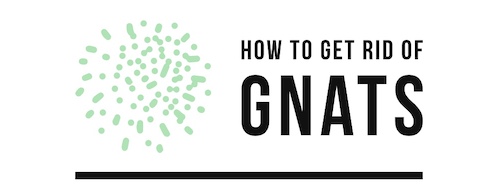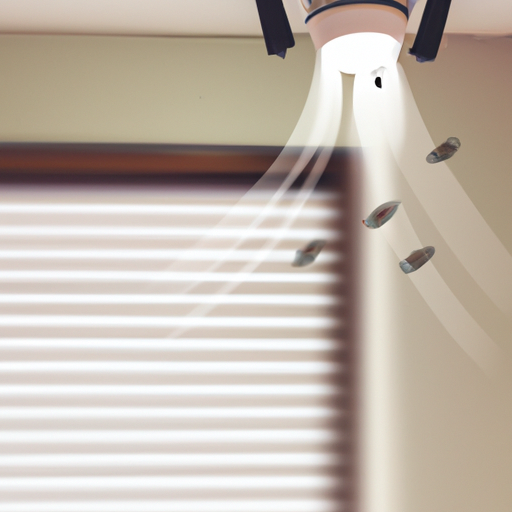How to Identify Gnats in Your Home and Stop Them from Breeding
Gnats are small, flying insects that can be a nuisance in your home. They are attracted to moist areas and can breed quickly if not controlled. Identifying the type of gnat in your home is the first step to stopping them from breeding.
Types of Gnats
There are several types of gnats that may be present in your home, including fruit flies, fungus gnats, and drain flies. Fruit flies have red eyes and tan bodies with black stripes on their wings. Fungus gnats have dark gray or black bodies with long legs and antennae. Drain flies have moth-like wings with a fuzzy body and short antennae.
Signs of Infestation
If you notice any of these types of gnats flying around your house or near windowsills or drains, it’s likely you have an infestation on your hands. You may also see clusters of eggs near damp areas such as sinks or potted plants where they lay their eggs before hatching into larvae within 24 hours. The larvae feed on organic matter such as decaying fruits and vegetables which can attract more adult gnats into the area if not removed promptly.
Preventing Breeding
To prevent further breeding, it’s important to identify the source of moisture that is attracting the gnats into your home in the first place – this could be anything from leaky pipes to over-watered plants – then take steps to eliminate it by repairing any leaks or reducing watering frequency for plants indoors. Additionally, make sure all food waste is disposed off properly so as not to attract more adult gnats looking for a meal! Finally, use insecticides specifically designed for killing off adult populations such as sprays containing pyrethrin or neem oil which will help reduce numbers quickly without posing too much risk to humans or pets living inside the house
Natural Ways to Get Rid of Gnats in the House
Gnats are small, pesky insects that can be a nuisance in the home. They are attracted to moist areas and feed on decaying organic matter. Fortunately, there are several natural ways to get rid of gnats in the house.
The first step is to identify where the gnats are coming from and eliminate any sources of standing water or dampness. This could include fixing leaky pipes, draining flower pots or other containers with standing water, and removing any rotting food or organic matter from around the house.
Next, try using natural repellents such as essential oils like peppermint oil or citronella oil which can be sprayed around windowsills and doorways to keep gnats away. You can also make your own traps by filling a jar with apple cider vinegar and adding a few drops of dish soap; this will attract the gnats who will then drown in the liquid mixture.
Finally, you can use beneficial insects such as ladybugs or lacewings which feed on aphids (a type of insect that attracts gnats) to help reduce their numbers naturally over time. Additionally, keeping your home clean by regularly vacuuming carpets and furniture will help reduce their numbers as well since they won’t have anywhere to hide or breed in your home if it’s kept tidy!
DIY Traps and Repellents for Controlling Gnat Infestations
Gnats can be a nuisance in the home, but there are several DIY traps and repellents that can help control gnat infestations.
Traps:
• Apple Cider Vinegar Trap: Fill a shallow bowl with apple cider vinegar and add a few drops of dish soap. The gnats will be attracted to the smell of the vinegar and will drown in the liquid.
• Red Wine Trap: Fill a shallow bowl with red wine and add a few drops of dish soap. The gnats will be attracted to the smell of the wine and will drown in it.
• Fruit Fly Trap: Place overripe fruit or vegetables in an open container, such as a jar or bowl, then cover it with plastic wrap secured by an elastic band. Poke small holes into the plastic wrap so that gnats can enter but not escape. The gnats will be attracted to the smell of rotting fruit or vegetables and get trapped inside.
Repellents:
• Citrus Repellent Spray: Mix equal parts water and lemon juice (or orange juice) in a spray bottle, then spray around windowsills, doorways, plants, etc., where you’ve seen signs of gnat activity. This natural repellent should keep them away for up to two weeks before needing reapplication.
• Essential Oil Repellent Spray: Mix 10-15 drops each of peppermint oil, eucalyptus oil, tea tree oil (or lavender oil), and lemongrass oil into 1 cup water in a spray bottle; shake well before use; then spray around windowsills, doorways etc., where you’ve seen signs of gnat activity every two weeks for best results
The Benefits of Using Insecticides to Control Gnats in the Home
Insecticides are a common and effective way to control gnats in the home. Gnats, also known as fruit flies or drain flies, can be a nuisance in any home. They breed quickly and can spread disease if left unchecked. Insecticides provide an effective solution for controlling these pests.
Insecticides come in many forms, including sprays, baits, and foggers. Sprays are the most common form of insecticide used to control gnats in the home. These products contain active ingredients that kill adult gnats on contact or repel them from entering your home. Baits are another option for controlling gnats; they contain attractants that draw the insects to them so they can be killed with an insecticide-based product. Foggers release a fine mist of insecticide into the air which kills adult gnats on contact and prevents new ones from entering your home through cracks and crevices.
Using insecticides to control gnats has several benefits over other methods of pest control such as traps or natural remedies like vinegar or essential oils:
* Insecticides provide quick results – you will see fewer gnats within hours after application
* Insecticides are easy to use – no special equipment is needed
* Insecticides offer long-term protection – they will continue killing adult gnats for weeks after application
* Insecticides are cost-effective – one treatment can last up to several months
In addition, using insecticides is safer than using chemical pesticides because it does not leave behind toxic residues that could harm people or pets when used according to label directions. For best results when using an insecticide against gnat infestations, it is important to read all instructions carefully before applying any product inside your home and follow all safety precautions listed on the label.
Tips for Preventing Future Gnat Infestations in Your Home
1. Keep your kitchen and bathroom areas clean and dry: Gnats are attracted to moist, damp areas, so it is important to keep these areas of your home clean and dry. Wipe down counters, sinks, and other surfaces regularly with a disinfectant cleaner. Make sure to empty the sink after each use and mop up any spills immediately.
2. Store food properly: Gnats are attracted to food sources such as fruits, vegetables, meats, dairy products, etc., so it is important to store these items in airtight containers or in the refrigerator when possible. This will help prevent gnats from being drawn into your home by the smell of food.
3. Seal cracks around windows and doors: Gnats can enter through small cracks around windows or doors if they are not sealed properly. Check for any gaps or holes that may be allowing them access into your home and seal them with caulk or weatherstripping if necessary.
4. Use insecticides: If you have an infestation of gnats in your home already then you may need to use insecticides such as sprays or foggers in order to get rid of them completely from your living space. Be sure to follow all instructions on the product label carefully before using any type of insecticide indoors!
5 .Keep outdoor trash cans covered: Make sure that all outdoor trash cans have tight-fitting lids on them at all times so that gnats cannot get inside easily when looking for a place to lay their eggs or feed on decaying organic matter inside the can itself!

